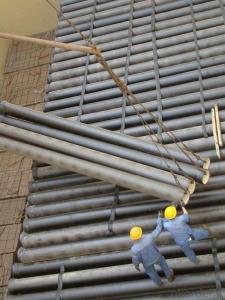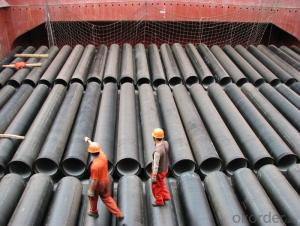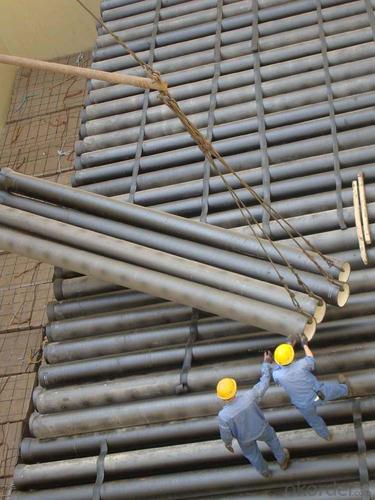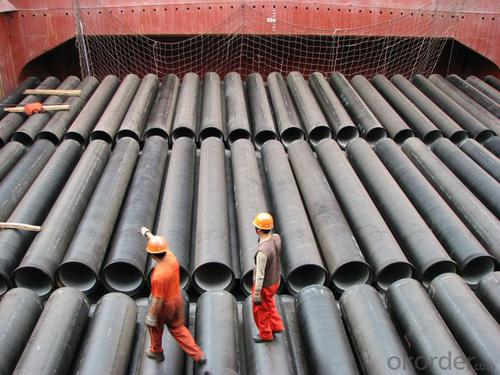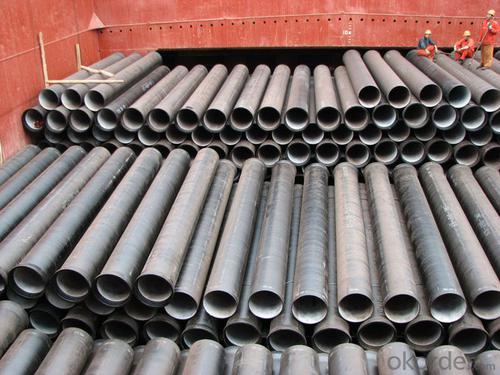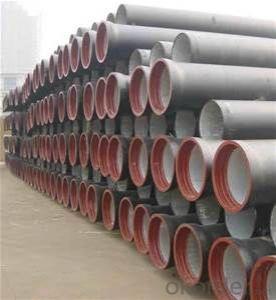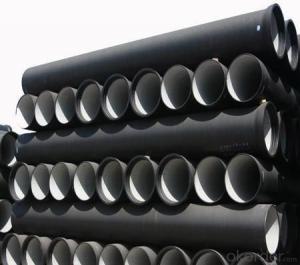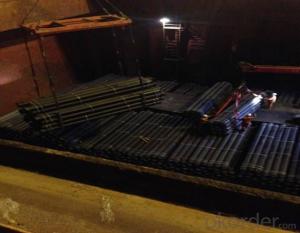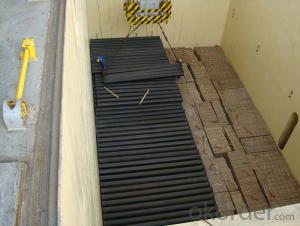DUCTILE IRON PIPE DN500 K9
- Loading Port:
- China Main Port
- Payment Terms:
- TT OR LC
- Min Order Qty:
- -
- Supply Capability:
- -
OKorder Service Pledge
OKorder Financial Service
You Might Also Like
Specification:
1) The standard of pipe: ISO2531:1998, K9
2) Effective length: 6m
3) Inner cement line: Portland cement line as per ISO4179
4) Zinc coating: at least 130g/m2 as per ISO8179
5) Bitumen painting: at least 70um as per ISO8179
6) With 100% quantity of NBR ring, or SBR ring, or EPDM ring as per ISO4633
7) DN80mm-800mm
8) High strength, lighter than grey iron, good corrosion resistance, no furring, small flow resistance, easy fixing, long life tome about 100 yeas
9) Produced by Hangzhou chunfeng machine
10) Checked by automatic inspection equipment
11) Composition:
Chemical composition | | | | |||
Chemical composition | Ductile Cast Iron Pipe (%) | Grey iron pipe (%) | Steel pipe (%) | | | |
C | 3.5-4.0 | 3.2-3.8 | 0.1-0.2 | | | |
Si | 1.9-2.6 | 1.4-2.2 | 0.15-0.4 | | | |
Mn | 0.15-0.45 | 0.4-0.6 | 0.3-0.6 | | | |
P | ≤0.06 | ≤0.3 | 0.02-0.03 | | | |
S | ≤0.02 | ≤0.1 | 0.02-0.03 | | | |
Mg | 0.03-0.06 |
|
| | | |
12) Feature:
Mechanical properties | | | | |||
| Ductile Cast Iron Pipe | Grey Iron Pipe | Steel Pipe | | | |
Tensile Strength(Mpa) | ≥420 | 150-260 | ≥400 | | | |
Yield Strength(Mpa) | ≥300 | No Confirmation | No Confirmation | | | |
Bending Strength(Mpa) | ≥590 | 200-360 | ≥400 | | | |
Elongation (%) | ≥10 | Neglected | ≥18 | | | |
Brinell Hardness(HBS) | ≤230 | ≤230 | About 140 | | | |
13) T type mechanical joint
14) Packing: in bulk or container
- Q: Are ductile iron pipes suitable for mining applications?
- Ductile iron pipes are indeed suitable for mining applications. This type of cast iron has undergone treatment to enhance its strength, durability, and ductility. Notably, these pipes possess high tensile strength and corrosion resistance, making them an ideal choice for underground mining operations that face harsh conditions. The ability of ductile iron pipes to withstand high pressure and heavy loads is one of their key advantages in mining applications. They exhibit excellent structural integrity and can withstand both internal and external forces, ensuring reliable performance in demanding mining environments. Moreover, ductile iron pipes have a long service life and require minimal maintenance. They offer exceptional resistance to abrasion, which is extremely important in mining operations where abrasive materials such as rocks, minerals, and ores are prevalent. Additionally, the smooth inner surface of these pipes minimizes friction, allowing for efficient transportation of mining materials. Furthermore, ductile iron pipes are a cost-effective option compared to alternatives like steel or concrete. They have a lower upfront cost and require less frequent replacements, resulting in reduced long-term expenses for mining companies. In conclusion, ductile iron pipes are highly suitable for mining applications due to their strength, durability, resistance to corrosion and abrasion, long service life, and cost-effectiveness. These pipes ensure reliable and efficient transportation of mining materials, thereby contributing to the overall efficiency and productivity of mining operations.
- Q: Is the fire hose capable of using rapid repair joints?
- Lubrication. Edible oil can be used as lubricant and evenly brush on the socket end and rubber ring.
- Q: Can ductile iron pipe be used for water treatment plant sludge handling?
- Indeed, water treatment plant sludge handling can utilize ductile iron pipe. Renowned for its robustness and longevity, ductile iron pipe is well-suited for managing diverse fluid types, such as sludge. It possesses the ability to endure the corrosive characteristics of sludge and remains resistant to abrasion, a crucial aspect in any sludge handling system. Moreover, the smooth interior surface of ductile iron pipe aids in preventing obstructions and facilitates the smooth flow of sludge, resulting in enhanced efficiency. In conclusion, ductile iron pipe is an dependable option for water treatment plant sludge handling.
- Q: Are ductile iron pipes suitable for use in acidic environments?
- Highly acidic environments are generally unsuitable for the use of ductile iron pipes. While ductile iron is recognized for its strength and durability, it does have limitations in acidic conditions. Over time, acidic environments tend to corrode and deteriorate ductile iron pipes. Corrosion occurs when the acid in the environment reacts with the iron in the pipe, eventually leading to pipe failure. The rate at which corrosion occurs depends on several factors, including the concentration and type of acid, temperature, and duration of exposure. Acidic environments with pH levels below 4 or 5 can significantly accelerate the corrosion process. To address this limitation, alternative materials such as stainless steel or corrosion-resistant alloys like PVC or HDPE pipes are often recommended for use in acidic environments. These materials exhibit superior resistance to corrosion and can withstand the harsh conditions associated with acidic environments. However, it is worth noting that ductile iron pipes may still be suitable for use in mildly acidic conditions or if protective measures are implemented to prevent corrosion. The application of protective coatings or linings to the pipes can help minimize the corrosive effects of acids. Consulting experts or engineers who are knowledgeable about the specific conditions and requirements of the project is crucial in determining the most appropriate material for use in acidic environments.
- Q: Can ductile iron pipes be used for irrigation of sports fields?
- Yes, ductile iron pipes can be used for irrigation of sports fields. Ductile iron pipes are known for their durability, strength, and corrosion resistance, making them suitable for various applications, including irrigation. They can effectively transport water over long distances and withstand the pressure required for irrigation systems. Additionally, ductile iron pipes have a long lifespan, reducing the need for frequent replacements and ensuring reliable irrigation for sports fields.
- Q: Can ductile iron pipe be used for industrial applications?
- Ductile iron pipe is well-suited for industrial applications due to its strength, durability, and flexibility. It is widely used in various industrial settings like power plants, chemical plants, refineries, and manufacturing plants for transporting water, wastewater, and other fluids. In these environments, where pipes may face exposure to chemicals, high temperatures, or abrasive materials, ductile iron pipe's resistance to corrosion is particularly important. Moreover, its high tensile strength enables it to endure high-pressure applications, making it an excellent choice for industrial use. Overall, ductile iron pipe proves to be a dependable and cost-effective option for a range of industrial applications.
- Q: What are the different pressure classes available for ductile iron pipes?
- Ductile iron pipes come in various pressure classes that are commonly used for water and wastewater purposes. These pressure classes, namely Class 150, Class 200, Class 250, Class 300, and Class 350, indicate the maximum pressure in psi that the pipes can withstand. For instance, Class 150 pipes have a maximum working pressure of 150 psi, while Class 200 pipes can handle up to 200 psi. Class 250 pipes can withstand pressures up to 250 psi, and Class 300 pipes have a maximum working pressure of 300 psi. Lastly, the highest pressure class, Class 350, can handle pressures up to 350 psi. The selection of the appropriate pressure class for a ductile iron pipe depends on several factors, including system design, fluid characteristics, and operating conditions. To determine the suitable pressure class for a specific application, it is crucial to consult relevant standards and guidelines, such as those provided by the American Water Works Association (AWWA). It is important to note that these pressure classes refer to the working pressure of the pipe, which is the pressure the pipe is designed to safely contain during normal operation. To ensure compliance with the required pressure class standards, the pipes are typically tested and certified.
- Q: Are there any alternatives to ductile iron pipe for water distribution?
- There are various options available for water distribution besides ductile iron pipe. Some commonly used alternatives include: 1. PVC (Polyvinyl Chloride) Pipe: PVC pipe is frequently chosen for water distribution due to its affordability, durability, and resistance to corrosion. It is lightweight, easy to install, and requires minimal maintenance. 2. HDPE (High-Density Polyethylene) Pipe: HDPE pipe is a flexible and durable choice for water distribution. It is resistant to corrosion, chemicals, and UV rays, making it suitable for both aboveground and underground installations. HDPE pipe is also known for its leak-free joints and long lifespan. 3. PEX (Cross-linked Polyethylene) Pipe: PEX pipe, a flexible plastic pipe, is commonly utilized for water distribution in residential and commercial settings. It is recognized for its ability to withstand freezing, scaling, and corrosion. PEX pipe is easy to install, has fewer joints, and is highly durable. 4. Copper Pipe: Copper pipe has a long history of use in water distribution due to its exceptional resistance to corrosion and extended lifespan. Although it is more expensive than other alternatives, copper pipe is renowned for its reliability and ability to handle high pressure. 5. Steel Pipe: Steel pipe is a robust and durable option for water distribution, particularly in high-pressure scenarios. It can endure extreme temperatures and resist external loads. However, steel pipe is more costly and requires specialized installation techniques. When selecting an alternative to ductile iron pipe for water distribution, it is crucial to consider factors such as cost, durability, corrosion resistance, installation requirements, and specific project needs.
- Q: How does ductile iron pipe compare to PVC pipe in terms of strength?
- Ductile iron pipe is generally considered to be stronger than PVC pipe. Ductile iron pipe is made of iron and carbon, which gives it a high tensile strength and resistance to breakage. It can withstand high pressures and is commonly used in heavy-duty applications such as water mains, sewer lines, and industrial piping. On the other hand, PVC pipe is made of a plastic material called polyvinyl chloride. While PVC pipe is lightweight and easy to handle, it is not as strong as ductile iron pipe. PVC pipe is typically used in low-pressure applications such as household plumbing, irrigation systems, and drainage pipes. When comparing the strength of ductile iron pipe to PVC pipe, the former has a higher capacity to handle heavy loads, withstand ground movement, and resist damage from external factors like rocks or tree roots. Ductile iron pipe is also more durable and has a longer lifespan compared to PVC pipe. However, it is important to note that the choice between ductile iron pipe and PVC pipe ultimately depends on the specific requirements of the project. Factors such as cost, environmental conditions, installation ease, and required longevity should all be taken into consideration when deciding which type of pipe to use.
- Q: Will the quality of ductile iron shrink?
- Fool you. It is normal that the surface shrinks and goes down, but it can not be said to be good.
Send your message to us
DUCTILE IRON PIPE DN500 K9
- Loading Port:
- China Main Port
- Payment Terms:
- TT OR LC
- Min Order Qty:
- -
- Supply Capability:
- -
OKorder Service Pledge
OKorder Financial Service
Similar products
Hot products
Hot Searches
Related keywords
